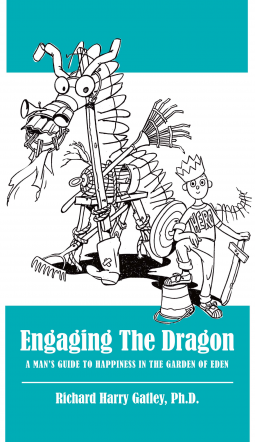
Engaging the Dragon
A Man's Guide to Happiness in the Garden of Eden
by Richard Harry Gatley, Ph.D.
This title was previously available on NetGalley and is now archived.
Send NetGalley books directly to your Kindle or Kindle app
1
To read on a Kindle or Kindle app, please add kindle@netgalley.com as an approved email address to receive files in your Amazon account. Click here for step-by-step instructions.
2
Also find your Kindle email address within your Amazon account, and enter it here.
Pub Date Mar 26 2013 | Archive Date Sep 07 2013
Description
Based on remarkably revealing scientific research and fifty years of clinical experience, Engaging the Dragon reveals the pernicious circumstances that undermine the best intentions of men and women in committed relationships. Casting aside mere speculation and prejudice about what couples face when they try to have a serious relationship, this book tells the truth about the daunting disparities between men and women that make marriage so challenging for men (and women) and disastrous for half of those who marry. Engaging the Dragon speaks to the partner in greatest need of assistance — in full hearing of his mate — and gives him not merely advice, but the basic tools he requires to be more effective in his relationship with his partner. For her part, a woman finally discovers why her husband acts so weird any time she wants to have a serious conversation with him, and learns what she can do to be more effective in accomplishing what she wants with her mate.
Couples think they already know what is wrong with their partner. Wives think their husbands don't care enough about their relationship; husbands think their wives are crazy. These theories are based on fear of what may be true, but the truth is: neither partner understands what is actually going on. Men have no idea what happens to their own bodies during marital conflict, nor do they realize how extraordinarily vulnerable they are to the disapproval of their wives. Simple criticism triggers alarming increases in a husband’s heart rate, blood pressure and other physiological measures. Mental functioning is often impaired as well when kitchen sinks begin to fly. Yet wives are oddly unperturbed by criticism, and as a consequence, they simply aren’t aware of the profound impact of criticism on their husbands. They fire away still thinking their husbands are functioning normally when in fact they are not.
Defensiveness and stonewalling are inevitable, and it is these reactions by their husbands that finally drive wives into the red zone. Husbands see no alternative — men actually believe “not reacting” will calm things down! They are blind to the fact that stonewalling infuriates women. These circumstances, which repeatedly characterize studies of marital conflict, are just the tip of the iceberg (or volcano). Imbalances due to socialization, rather than physiology, also assure disaster.
By age 13, girls are forced by social expectations to convert open conflict into more indirect forms of aggression that are characterized by social manipulation. They bring these subtler, often fierce, forms of aggression into their relationships with men. But boys never learn how to fight like girls, and when they marry, men have few defenses against feminine aggression. Physical aggression is prohibited. As a consequence, marital conflict is disastrously difficult for men, and enormously frustrating for women.
Easily defeated by feminine tactics, men seek a more satisfying role as hero, hoping to win their mate’s favor by being genuinely helpful. Successful to some extent (“honey-do” lists), the “fix-it” prescription nonetheless fails horribly when a man applies it to his wife’s emotions. A woman wants recognition of her feelings, she doesn’t want them “fixed.” A man’s confusion about this stems from a misunderstanding of his wife, certainly, but there is also a basic misunderstanding of the role of “hero.” The “hero” isn’t a mature archetype, and as a consequence, the pursuit of the heroic tends to interfere with maturation. It causes us to focus on the doing and fixing of things and makes it more difficult for us to recognize and care for others, including their emotions, needs and so forth.
Engaging the Dragon shows men (and women) how to become more effective (calmer and more disciplined) in relating to others. It teaches skills that are essential to a relationship, and does so simply and directly, with a sense of humor.
Advance Praise
No Advance Praise Available
No Advance Praise Available
Marketing Plan
No Marketing Info Available
No Marketing Info Available
Available Editions
| EDITION | Paperback |
| ISBN | 9781938223952 |
| PRICE | $14.99 (USD) |



